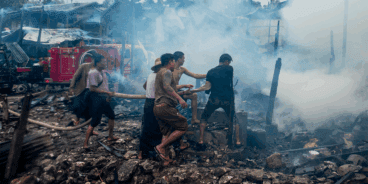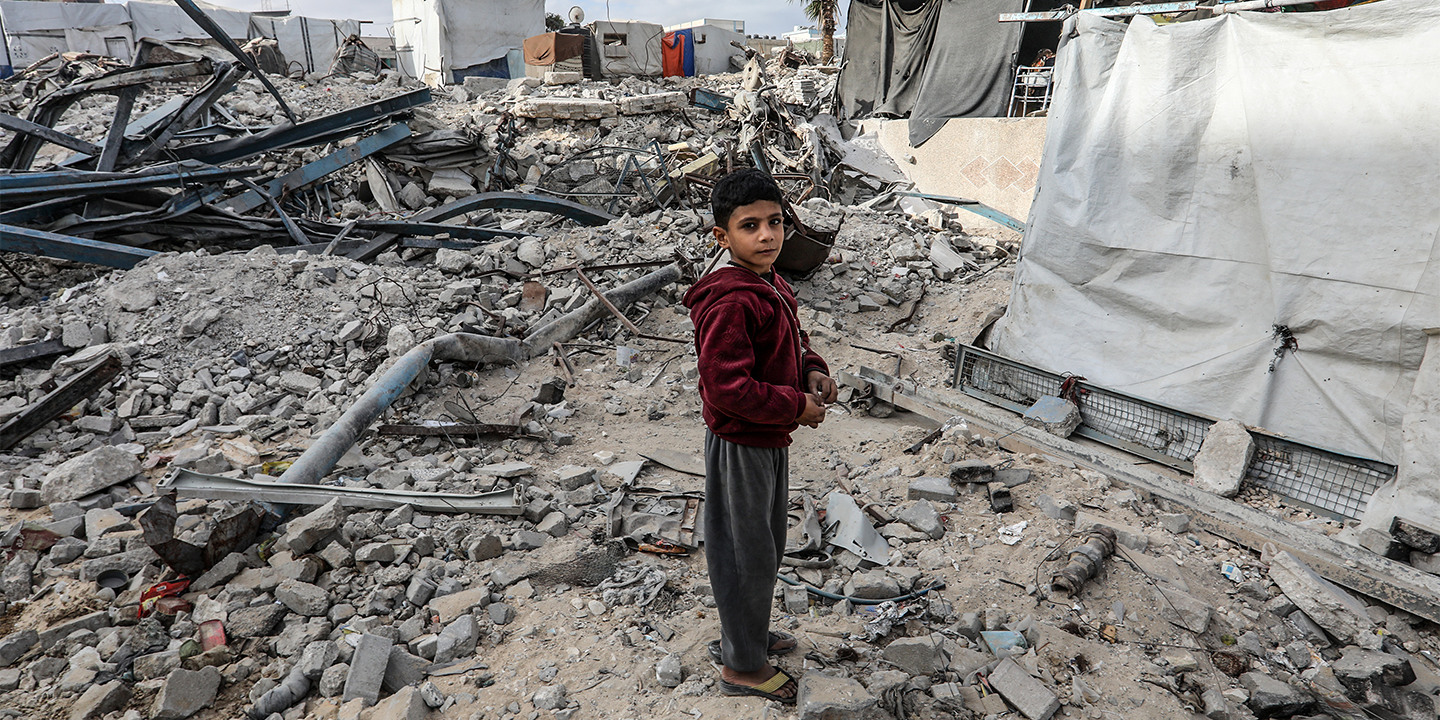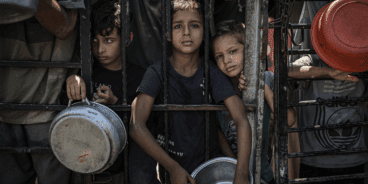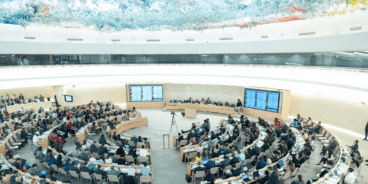

Atrocity Alert No. 419: Israel and the Occupied Palestinian Territory, Global Landmine Report and Crimes Against Humanity Treaty
Atrocity Alert is a weekly publication by the Global Centre for the Responsibility to Protect highlighting situations where populations are at risk of, or are enduring, mass atrocity crimes.
“GENOCIDE UNFOLDING” AGAINST PALESTINIANS IN GAZA, SAYS UN COMMITTEE
On 21 November the International Criminal Court (ICC) issued arrest warrants against senior Israeli leaders and a Hamas official related to the situation in Palestine. The ICC judges concluded that there are reasonable grounds to believe that Prime Minister Benjamin Netanyahu and former Defense Minister Yoav Gallant are responsible for war crimes and crimes against humanity from at least 8 October 2023, including the starvation of civilians, intentionally directing attacks against a civilian population, murder and persecution. The judges further determined that there are reasonable grounds to believe that Mohammed Diab Ibrahim al-Masri, commander-in-chief of Hamas’ military wing, is responsible for war crimes and crimes against humanity in Israel and Gaza since at least 7 October 2023, including extermination, murder and hostage-taking. The decision came six months after ICC Chief Prosecutor Karim Khan requested the warrants. Chief Prosecutor Khan withdrew requests for warrants for two other senior Hamas figures who have both since been killed.
The pervasive lack of accountability throughout successive cycles of deadly hostilities between Israel and Hamas and other Palestinian armed groups has enabled the unfathomable horrors today. While presenting their latest report to the UN General Assembly on 18 November, the Chair of the UN Special Committee to Investigate Israeli Practices Affecting the Human Rights of the Palestinian People and Other Arabs of the Occupied Territories, warned, “A genocide is unfolding before our eyes. Failing to act now—failing to put an end to this atrocity crime— will tear apart the very foundation of the international rule of law we have collectively built to protect peace, security, and the well-being of all. Our inaction today is setting a perilous precedent for tomorrow.”
The Special Committee’s report determined that Israel’s methods of war align with the characteristics of genocide. Statements by officials, as well as the systematic and unlawful interference of humanitarian aid, alongside targeted attacks and the killing of aid workers “make Israel’s intent clear: to turn lifesaving supplies into tools of war,” deliberately causing death, starvation and serious injury. The Special Committee asserted that Israeli has used starvation as a method of war and is inflicting collective punishment on the Palestinian people.
The report also details harrowing instances of sexual and gender-based violence against Palestinian women and girls by Israeli forces, as well as the intentional killing of women and children as they attempt to flee or seek refuge, including within hospitals where mass graves have been found. The Special Committee noted, “This systematic targeting of women and children, combined with horrific restrictions, is inflicting devastating physical and mental harm, creating life-threatening conditions, and preventing births among Palestinian women in Gaza.”
These developments are in flagrant violation of Israel’s obligations as an occupying power under International Humanitarian Law and of three binding provisional measures orders by the International Court of Justice (ICJ), issued in the case brought by South Africa against Israel for alleged violations of the Genocide Convention.
Christine Caldera, Research and Advocacy Officer at the Global Centre for the Responsibility to Protect, said, “The arrest warrants are a necessary and welcome step toward ending impunity for perpetrators of atrocity crimes in Israel and Gaza and are critical for confronting the root causes and preventing recurrence. The ICC must be allowed to conduct its mandate with independence and impartiality.” States must immediately implement an arms embargo on Israel, as well as apply other economic and political measures necessary to ensure respect for international law and implementation of the ICJ’s provisional measures orders.
LATEST GLOBAL LANDMINE REPORT FINDS EXTENSIVE USE OF ANTIPERSONNEL MINES
Each year thousands of civilians are killed or injured by landmines and other explosive weapons around the world. According to the latest Landmine Monitor report released by the International Campaign to Ban Landmines (ICBL), during 2023 there was a “troubling rise” in landmine casualties, particularly due to the use of antipersonnel mines by states that are not party to the Mine Ban Treaty. A total of 164 countries have joined the treaty, which took effect 25 years ago and comprehensively prohibits antipersonnel mines and requires countries to destroy stockpiles, clear mine-affected areas and assist victims.
In 2023 at least 5,757 people were killed and wounded by landmines and explosive remnants of war, with civilians accounting for 84 percent of the casualties. An alarming 37 percent of victims were children. For the first time, Myanmar (Burma) had the highest number of landmine casualties, with 1,003 civilians killed and wounded amid new instances of antipersonnel mine use by government forces and opposition groups. Previously, Syria had topped the list for three consecutive years. In 2023 Syria recorded the second highest number of casualties with 933 victims, followed by Afghanistan and Ukraine, which both had more than 500 recorded casualties.
While the Myanmar military has long used antipersonnel mines, the ICBL documented a significant increase in landmine use, particularly since the anti-junta offensive Operation 1027 launched in October 2023. A group of UN Special Rapporteurs stressed, “The junta is doubling the impact of its extensive use of landmines to crush nationwide resistance.”
Meanwhile, according to the ICBL, Russia’s extensive use of antipersonnel mines since the full-scale invasion of Ukraine in 2022 is “an unprecedented case of a state outside the treaty deploying landmines within the territory of a State Party.” Ukraine is one of the most heavily mined areas in the world and will require decades of clearance efforts. On 19 November the United States announced the planned transfer of banned antipersonnel landmines to Ukraine, which as a state party, is prohibited from using antipersonnel landmines under any circumstances.
Non-state armed groups have also used antipersonnel mines. The ICBL documented new landmine use by such groups in several countries, including in Burkina Faso, Cameroon, the Democratic Republic of the Congo, Mali, Niger and Nigeria. Armed groups continued to use these banned weapons in Myanmar, Palestine and elsewhere.
Executive Director of the Global Centre for the Responsibility to Protect, Savita Pawnday, said, “Landmines are inherently indiscriminate and threaten the lives and livelihoods of civilians in the present and for decades to come. All UN member states must sign and adhere to the Mine Ban Treaty. Governments meeting at this week’s Mine Ban Treaty conference should condemn the increasing use of antipersonnel landmines and any sales or transfers of such weapons and strengthen efforts to support victims and survivors, including through adequate funding of clearance operations.”
UN RESOLUTION MARKS MAJOR STEP TOWARD TREATY ON CRIMES AGAINST HUMANITY
On Friday, 22 November, the UN General Assembly’s Sixth Committee adopted a landmark resolution, setting the stage for negotiations on a dedicated treaty to prevent and punish crimes against humanity. Unlike the conventions for genocide and war crimes, there is currently no stand-alone international treaty that codifies crimes against humanity or associated obligations to prevent and punish. This gap in international law contributes to impunity for these atrocities and creates a false hierarchy between equally egregious atrocities. The adopted resolution calls for a time-bound process with preparatory sessions in 2026 and 2027, and a diplomatic conference in 2028 and 2029 to finalize a treaty on crimes against humanity.
This important milestone is the result of a long process that started in 2008, when the Washington University Law School launched the Crimes Against Humanity Initiative to explore the need for such a treaty. Five years later, the International Law Commission – a UN body tasked with developing and codifying international law – added the topic to its program of work and presented its Draft Articles on the Prevention and Punishment of Crimes Against Humanity in 2019. Action on the Draft Articles had stalled for several years until 2022, when the Sixth Committee – under the exemplary leadership of Mexico and The Gambia – shifted from merely acknowledging the Draft Articles to engaging in substantive discussions, paving the way for formal treaty negotiations.
After several intense hours of last-minute deliberations on Friday, the Sixth Committee upheld its tradition of consensus by reaching a compromise text negotiated by Mexico and The Gambia, on behalf of the core group, and Russia. A total of 99 member states representing a broad cross-regional group co-sponsored the resolution, demonstrating significant international support for the initiative and highlighting the growing consensus around the need for a dedicated treaty on crimes against humanity. Amadou Jaiteh, The Gambia’s Sixth Committee representative, said, “We dare to lead a way forward, and we are grateful to all delegations that shared this daring journey of hope for a better world – a world without crimes against humanity and a world where voices of victims are heard louder than their perpetrators.”
Developing a treaty on crimes against humanity offers a crucial opportunity to address a significant legal gap in the atrocity prevention framework. It aims to strengthen cooperation between states through legal harmonization and to close impunity gaps by establishing a framework for prosecution and punishment. It is essential that all member states engage constructively in the process of creating a robust and comprehensive international treaty that seeks universal support. Furthermore, member states must ensure that victims and survivors, and civil society organizations, can participate meaningfully and effectively at every stage of the process.
Related Content


Atrocity Alert No. 448: Israel and the Occupied Palestinian Territory, Sudan and China
